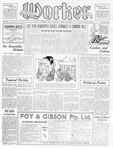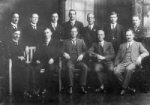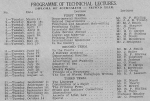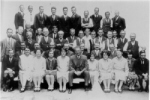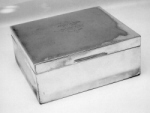
With the editor writing up to 15 columns a week, the circulation of the Westralian Worker rose 30 percent in the first six weeks.
The lay-out of the paper began to look less random, and just a little like the Sunday Times next door. Tabloid words like 'Sensation' and 'Shock' appeared in the headlines.

Headline
for a page 1 story in the
Westralian Worker 21 July 1922
The logo shifted from a severe black on white contrast to something lighter and more flambuoyant. (Both the old and new logos were hand-drawn, not uncommon at that time.) There was more display advertising. And beneath the logo was a typical Curtin flourish - an inspirational message or reminder such as this text from the Worker of 2 December 1927.
'The people are silence. I will be the advocate of this silence. I will speak for the dumb. I will speak of the small to the great and of the feeble to the strong... I will be the Word of the People.'
By late 1922, the Westralian Worker had as smart a lay-out as any paper in Perth. Westralian Worker, 15 September 1922 page 1.
It was always a battle to keep the Worker afloat financially. It often came with union membership, and when the subscription rates were raised there were complaints.
However, such an increase did not worry the paper's supporters like Tom Lewington who was at the time the longest-serving member of the ALP in WA. The arrival of the Worker at his small weatherboard cottage in South Fremantle was the highlight of the week, as related by his son Len, a well-known South Fremantle labour activist.
'Worker'
Well,
see, it was a Labor paper. It was a working paper - all the dealings
of running the country I suppose, and politics to a certain extent.
You know rules and regulations for workers and factories and that type
of thing. What he couldn't find out well I would explain it to him.
No, my old man was a very staunch ALP man all the way through. He worked
his heart out for it.
Curtin found himself engaged in a battle on the front page with Victor Courtney and J J Simons, the proprietors of two other smallish papers, the Mirror and the Call.
Curtin's biographer, Lloyd Ross, while confusing the details of the battle, draws on an interview with Sebastian Bartholomew (Jack) Nielson, the overseer at the Worker, to provide a rare glimpse of Curtin at work as a journalist.
JJ Simons, c 1920. Westralian Worker, 18 March 1921 page 1.
Nielson's story, presented complete with direct quotes, has Curtin running up the steps to his partitioned office one Friday afternoon, publication time. He said he wanted to substitute the page one story on ALP candidates already set up with one he'd write attacking Simons, who had just resigned from the Labor Party.
Nielson's account has a Hollywood touch about it, and you almost expect Curtin to shout, 'Hold page one! I've got a scoop'. Having obtained a 30-minute reprieve from Nielson, Curtin began passing page after page of hand-written copy to his reluctant overseer, who took them to the linotype operators to be set.
Whatever happened that afternoon, we know that at least some of the editorials and the mass of stories were dictated at speed to his secretary, Emma Moore, while he paced the floor.
Nielson also provides an interesting account of how his editor set his creativity running again after a word-block, however brief: head off, find someone, start talking, then race back - sometimes in mid-sentence - as the blockage eased.

Headlines for the 'more-in-sorrow-than-anger'
article hastily penned by Curtin for his front
page battle with JJ Simons, the member
for East Perth and a former protege he
believed had deserted the Labor cause.
Read all about the 'Battle of the Front Page'!
John Curtin and the Australian Journalists' Association
Curtin was elected as a member of the Australian Journalists' Association within a month of arriving at the Worker.
Four months later he was representing the cash-strapped Kalgoorlie sub-district, and by 1920 he was the State President. He wanted to head a journalists' union with strong Trades Hall links but his membership was non-political.
He came to socialise with the hated 'proprietors of the capitalist press' - and seemed to get on with them.
While he thundered in his editorials and headlines, John Curtin was building up a reputation for resolving disputes, particularly those involving the printers.
Curtin had no doubt about the importance of his craft.
When he was both editor of the Worker and president of the AJA, he wrote enthusiastically of the power of the press.
A more frequently held view of the journalist was less grand: 'The refuge of the failed all-rounder'.
The
Editor Writes a Message
----------
The power of the Press is greater than that of the Caesars of the school books or the statesmen of our existing legislatures. It shapes and moulds the thoughts of millions, even as the potter shapes the clay spinning on his wheel.
Westralian Worker 17 March 1922
As president of the AJA, Curtin had met academics like Walter Murdoch, the essayist, and E O G Shann, the economic historian.
He played a leading part in organising these and other academics to give lectures to journalists but the clash between academic and practical interests was always a problem. However, the courses did provide a link between two groups of opinion makers.
Final years at the Worker
The content of Curtin's editorials during his final six years at the Worker was much more diverse than earlier. He had been a delegate to the International Labour Conference in Geneva in mid-1924. From the time he returned at least half his editorials were devoted to international affairs.
He remained an anti-imperialist, and opposed the attempts of Britain and France to dominate affairs in Europe while he continued to regard Germany with a sympathetic eye. He was critical of the rise of fascism in Italy, but did not regard it as a major threat.
On the home front Curtin's editorials were aimed at promoting and strengthening the Labor Party. He made many appeals for unity, stressed the need for more effective publicity and educational campaigns, social welfare programs and a policy of economic self-sufficiency for Australia.
Then, in December 1928, John Curtin entered Parliament as the MHR for Fremantle.
The Worker staff was devastated in a way which is well described by Frances Shea, an office junior.
Mr
Curtin Retires and Mr
Gates Succeeds
--------
All of us together have fought hard for the common purpose and whatever use I have been in aiding the progress of the paper, the widening of its influence, and the promotion of its prestige, has been made entirely possible by the friendship that has been given me, and, more particularly, by the example of industry and sincerity which has surrounded me from the day I entered service down to the present moment.
Westralian Worker 7 December1928
